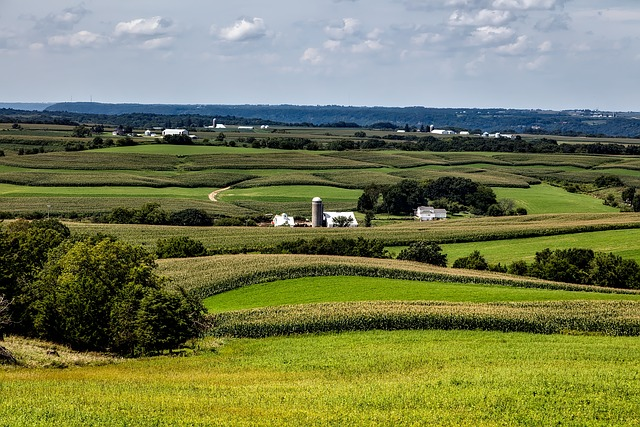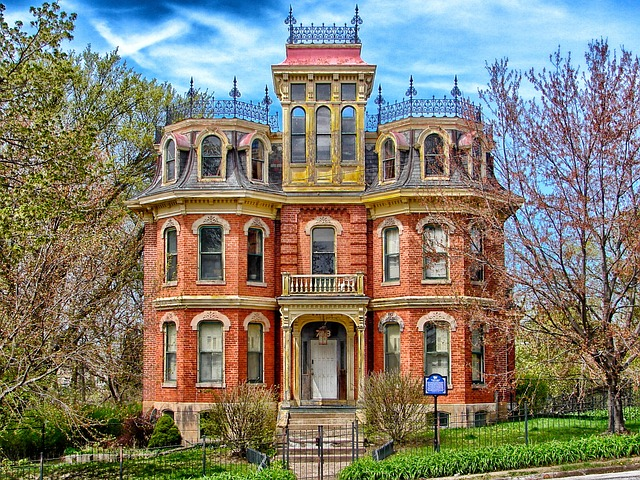
When it comes to investing in real estate, many investors think of bustling metropolitan areas like New York, Los Angeles, or Miami. However, there’s a hidden gem in the heart of the United States that often goes overlooked: Iowa. With its strong and stable economy, affordable housing market, and a quality of life that’s hard to beat, Iowa offers a plethora of reasons why you should consider investing in its real estate market. In this article, we will delve into the numerous advantages of investing in Iowa real estate and explore the key factors that make this state an attractive destination for investors.
New to passive real estate investing?
Explore Ark7 OpportunitiesWhy Invest in Iowa?
There are a number of reasons why Iowa is something of a dark horse for real estate investing. Let’s explore what makes it a strong contender on the national market.
Economic Stability
One of the primary reasons to consider investing in Iowa real estate is the state’s remarkable economic stability. Iowa has a diversified economy that includes agriculture, manufacturing, healthcare, technology, and renewable energy sectors. This diversity has insulated the state from severe economic downturns, making it a safe and attractive place for real estate investments.
Agriculture plays a significant role in Iowa’s economy, with the state being a leading producer of corn, soybeans, and pork. The agricultural sector’s stability provides a solid foundation for the state’s economy, and many residents working in this industry need housing, creating consistent demand for real estate.
Strong Job Market
Iowa boasts a robust job market, and its unemployment rate is typically lower than the national average. The state is home to numerous Fortune 500 companies, such as Principal Financial Group, John Deere, and Rockwell Collins, which offer stable employment opportunities. Additionally, Iowa’s focus on renewable energy has led to job growth in the wind and solar energy sectors, further contributing to the state’s economic stability.
Investors in Iowa real estate can tap into the demand created by this strong job market. Young professionals, families, and skilled workers flock to Iowa for job opportunities, thereby driving the demand for rental and residential properties.
Affordable Housing Market
Compared to many coastal cities and even neighboring states, Iowa’s housing market is notably more affordable. The cost of living in Iowa is lower than the national average, making homeownership more accessible to a broader population. As a real estate investor, you can benefit from this affordability by acquiring properties that are not only reasonably priced but also offer attractive rental income potential.
Steady Population Growth
Iowa has experienced steady population growth over the years, thanks to a combination of natural growth and in-migration. Many people are drawn to Iowa’s friendly communities, low crime rates, and high-quality education. This influx of residents contributes to a consistent and growing demand for housing, making it an ideal environment for real estate investors.
Quality of Life
Iowa is known for its high quality of life. The state consistently ranks well in various quality-of-life metrics, including education, healthcare, safety, and overall well-being. This quality of life is a significant draw for both residents and potential tenants, making your real estate investments in Iowa appealing to a wide range of individuals and families.
Proximity to Major Cities
While Iowa is not a coastal state, it offers excellent connectivity to major cities in the Midwest and beyond. For example, Des Moines, the state’s capital, is just a few hours’ drive from Chicago, Minneapolis, and Kansas City. This proximity to major cities enhances the appeal of Iowa as a real estate investment destination, as it makes the state accessible for those who want to enjoy a quieter lifestyle while still having easy access to urban amenities.
Strong Rental Market
If you’re interested in investing in rental properties, Iowa offers a robust rental market. The state’s affordability and job opportunities attract a steady influx of renters, providing you with a reliable tenant base. Whether you’re looking to invest in single-family homes, apartments, or student housing near the state’s universities, there are ample opportunities to generate rental income.
Educational Institutions
Iowa is home to several prestigious educational institutions, including the University of Iowa, Iowa State University, and Drake University. These universities attract students from around the country and the world, creating a consistent demand for student housing. If you’re interested in the student rental market, investing in properties near these universities can be a lucrative venture.
Potential for Appreciation
While Iowa’s real estate market is known for its stability, there is still potential for property appreciation, especially in the growing metropolitan areas. Des Moines, Cedar Rapids, and Iowa City, for example, have witnessed steady growth in property values in recent years. By carefully selecting your investment properties and targeting areas with strong growth potential, you can benefit from both rental income and property appreciation.
Favorable Real Estate Laws
Iowa has investor-friendly real estate laws, which can make the process of buying, owning, and managing properties relatively straightforward. The state offers protections for both landlords and tenants, making it a balanced environment for real estate investments.
Top 3 Best Real Estate Investment Markets in Iowa
Iowa, often referred to as the Heartland of America, is a prime location for real estate investment. Its stable economy, strong job market, and affordable housing market make it an attractive destination for investors. In this article, we will explore the top three real estate investment markets in Iowa: long-term rental properties, short-term rentals, and house flipping. Each of these markets offers unique opportunities for investors seeking to grow their wealth in the Hawkeye State.
Long Term Rental Properties
Long-term rental properties are a time-tested and steady investment option in Iowa. Here’s why they are a top choice for many investors:
A. Steady Income Stream: Long-term rental properties provide a consistent monthly income through rent payments, making them a reliable source of revenue. This income can help offset property-related expenses and contribute to long-term financial stability.
B. Low Vacancy Rates: Iowa’s stable job market and growing population ensure a low vacancy rate for rental properties. This means that you’re likely to find tenants quickly and reduce the periods when your property remains vacant.
C. Diverse Tenant Base: Iowa’s diverse economy attracts a wide range of residents, from young professionals to families and retirees. This diversity translates to a broader tenant base, increasing your chances of finding suitable renters.
D. Appreciation Potential: While long-term rental properties are primarily chosen for their cash flow, Iowa’s growing metropolitan areas offer the potential for property appreciation over time, which can boost the overall return on investment.
Short Term Rentals
Short-term rentals, often facilitated through platforms like Airbnb and VRBO, have gained popularity in recent years. Here’s why Iowa’s short-term rental market is a top choice for investors:
A. Tourism and Events: Iowa hosts a variety of events and attractions that draw tourists throughout the year. From the Iowa State Fair to college football games and cultural festivals, these events create a strong demand for short-term accommodations.
B. Seasonal Flexibility: Short-term rentals offer the flexibility to adjust pricing and availability based on seasonal demand. You can charge higher rates during peak tourist seasons and block out dates during slower periods, optimizing your income.
C. Enhanced Cash Flow: Short-term rentals often generate higher rental income compared to traditional long-term leases. This means you can earn more per night and potentially surpass the earnings from a long-term rental in a shorter amount of time.
D. Tax Benefits: Short-term rental properties may offer tax advantages, including deductions for expenses related to the property, such as maintenance and furnishings. It’s essential to consult with a tax professional to maximize these benefits.
House Flipping

House flipping, the process of buying distressed properties, renovating them, and then selling for a profit, is another lucrative investment market in Iowa. Here’s why it’s an attractive choice for investors:
A. Profit Potential: Iowa’s affordable housing market presents opportunities for investors to purchase properties at a reasonable price, leaving room for substantial renovations and profit margins upon resale.
B. Growing Demand: Buyers are often attracted to turnkey homes with modern amenities and finishes. By renovating properties to meet these preferences, you can tap into the growing demand for updated housing options.
C. Favorable Real Estate Laws: Iowa’s real estate laws make the house flipping process relatively straightforward, providing investor-friendly conditions to navigate the market.
D. Diverse Locations: Iowa offers diverse locations for house flipping, from urban areas to smaller towns. This variety allows investors to target markets that align with their expertise and objectives.
Iowa Real Estate Market Investing Overview
The real estate market in Iowa offers a unique landscape for investors, with opportunities ranging from long-term rental properties to house flipping. To make informed investment decisions, it’s essential to have a comprehensive understanding of various market factors, including median home prices, housing market dynamics, property appreciation rates, demographics, employment data, and school ratings. Let’s delve into these crucial aspects to provide you with a comprehensive overview of the Iowa real estate market.
Iowa Median Home Prices
The median home price in Iowa is a significant factor for real estate investors. As of latest available data, the median home price in Iowa stands at about $229,000 (via Redfin). This affordability, when compared to national averages, makes Iowa a viable option for property investment.
Iowa Housing Market Overview
Iowa’s housing market is known for its stability. The state enjoys a diverse economy (which we will get into in a subsequent section), low unemployment rates, and a steady job market. These factors contribute to a strong demand for housing, making it an attractive market for long-term rental properties.
Iowa Home Appreciation Rates
Iowa has experienced steady home appreciation rates over the years. While these rates may not be as high as in some coastal areas, Iowa’s real estate market provides a balance of stable growth and low volatility. Investors looking for consistent returns over the long term often find Iowa’s appreciation rates appealing.
Iowa Rent Vs Owner Occupied By Household Type
Iowa’s housing market caters to a diverse range of residents. While many choose to own their homes, a significant portion of the population rents. This diversity in housing preferences creates opportunities for both rental property investors and those targeting the homeowner demographic.
Iowa Age Of Homes
The age of homes in Iowa varies, with some dating back over a century and others being relatively new. Investors interested in house flipping may find older properties with renovation potential, while those looking for long-term rentals might prefer newer, low-maintenance homes.
Compare Investment Property Loan Rates in Iowa

Interest rates on investment property loans play a crucial role in determining the profitability of real estate investments. It’s essential for investors to compare loan rates and terms from different financial institutions to secure the best financing for their investment ventures.
Iowa Property Price To Income Ratio Over Time
The property price-to-income ratio is a key indicator of housing affordability. By analyzing this ratio over time, investors can gauge whether properties in Iowa are becoming more or less affordable, helping inform their investment strategies.
Iowa Population By Year
Iowa’s population has exhibited consistent growth over the years. A growing population indicates increased demand for housing, making it an attractive prospect for real estate investors seeking long-term income opportunities.
Iowa Population By Age And Sex
Understanding the age and gender distribution of Iowa’s population is vital for tailoring real estate investments to the needs of the local community. Different demographics may have specific housing requirements and preferences that investors should consider.
Iowa Per Capita Income
Iowa’s per capita income reflects the state’s overall economic health. A rising per capita income suggests greater purchasing power, potentially leading to higher rental rates and property values in the long run.
Iowa Population Over Time
A stable and growing population is a positive sign for real estate investors. It signifies a consistent demand for housing, whether for homeowners or renters, contributing to long-term investment stability.
Iowa Average Salary Over Time
Analyzing the trend in average salaries can help investors understand income dynamics in the state. This information can be valuable in setting rental rates that align with tenants’ financial capacity.
Iowa Employment Distribution By Age
Iowa’s employment distribution by age is essential for identifying potential tenant pools. Different age groups have varying employment needs, and this information can guide investors in property management and marketing strategies.
Iowa Employment Rate Over Time
The employment rate trend in Iowa is a critical factor to consider when evaluating real estate investments. A stable or improving employment rate indicates a strong economy, contributing to the overall attractiveness of the state for investors.
Iowa School Ratings
School ratings are vital for investors interested in family-oriented properties, such as single-family homes and apartments. Access to quality education is a key consideration for families when choosing a place to live.
Iowa Employment Industries (Top 10)
Iowa’s economic landscape is as diverse as its scenic beauty. The state is home to a robust and stable job market, thanks to a variety of thriving industries. In this article, we will explore the top ten employment industries supporting the economy in Iowa. These sectors not only contribute to the state’s financial well-being but also create numerous job opportunities for its residents.
1. Agriculture
Iowa’s rich and fertile land has earned it the nickname “The Corn State.” Agriculture has been a cornerstone of the state’s economy for generations, with crops like corn and soybeans being top exports. The agricultural industry supports a vast network of farmers, farmworkers, and agribusinesses, making it one of Iowa’s most critical economic pillars.
2. Manufacturing
Iowa has a strong manufacturing sector, producing a wide range of goods, from machinery and equipment to food products. Manufacturing is a significant contributor to the state’s economy, providing employment opportunities for skilled workers and contributing to export revenues.
3. Healthcare
The healthcare industry is a growing force in Iowa, driven by an aging population and increased access to medical services. The state is home to world-class hospitals, clinics, and research facilities, offering a wide array of job opportunities for healthcare professionals, including doctors, nurses, and support staff.
4. Education
Iowa’s education sector encompasses K-12 public schools, private schools, and higher education institutions. With a commitment to quality education, the state employs a substantial number of teachers, administrators, and support personnel. Moreover, universities and colleges provide additional jobs in research, administration, and student support services.
5. Financial Services
The financial sector in Iowa is a significant contributor to the state’s economy, with numerous banks, credit unions, and insurance companies operating within its borders. This sector provides employment opportunities for financial analysts, bankers, insurance agents, and other professionals.
6. Information Technology
Iowa has seen a surge in its information technology industry, particularly in cities like Des Moines. The state is becoming a tech hub, with companies specializing in software development, data analytics, and cybersecurity. The demand for skilled IT professionals in Iowa continues to grow.
7. Renewable Energy
Iowa is a leader in renewable energy production, particularly in wind energy. The state’s wind farms generate substantial amounts of electricity, driving employment in this eco-friendly sector. Skilled technicians, engineers, and maintenance workers are in demand in the renewable energy industry.
8. Transportation and Logistics
Located in the heart of the country, Iowa plays a crucial role in the nation’s transportation and logistics networks. The state’s central location and well-maintained infrastructure support a strong transportation and warehousing industry, providing jobs in trucking, distribution, and logistics management.
9. Biotechnology
Iowa is home to biotechnology companies engaged in research, development, and production in the life sciences sector. These companies create jobs for researchers, scientists, and biotechnicians working on groundbreaking discoveries in healthcare, agriculture, and environmental solutions.
10. Retail Trade
The retail industry remains a vital component of Iowa’s economy. A broad range of retail stores, from local shops to national chains, provides jobs for sales associates, managers, and support staff. The sector continues to adapt to changing consumer preferences, offering diverse career opportunities.
Best 7 Places to Invest in Iowa

Cedar Rapids, IA
Cedar Rapids, the second-largest city in Iowa, is a dynamic real estate market known for its stable economy and strong job market. The city is home to several major employers, including Rockwell Collins, Transamerica, and Cargill. With a diversified economy and a growing population, Cedar Rapids offers a wide range of investment opportunities, from long-term rental properties to commercial real estate ventures.
Davenport, IA

Davenport, situated along the Mississippi River, offers investors an exciting blend of history and modernity. The city’s vibrant downtown and cultural scene make it an attractive destination for renters and homebuyers alike. Davenport’s proximity to the Quad Cities area, along with a thriving healthcare sector, contributes to its robust real estate market.
Iowa City, IA
Home to the University of Iowa, Iowa City is a hub of education, culture, and innovation. The presence of a major university ensures a consistent demand for student housing, making it an excellent choice for real estate investors. Additionally, the city’s strong healthcare sector and vibrant downtown create a diverse and stable real estate market.
Des Moines, IA (Including West Des Moines)

Des Moines, the capital city of Iowa, and its western suburb, West Des Moines, form a dynamic real estate market with strong economic fundamentals. The area boasts a thriving financial sector, with companies like Principal Financial Group and Wells Fargo having a significant presence. The job market is stable, and the cost of living is relatively low, making it an attractive place for both renters and buyers.
State Center, IA
For those looking for a more rural investment opportunity, State Center is a charming option. Located in central Iowa, this small town offers a peaceful atmosphere and opportunities for investment in residential properties, particularly single-family homes. State Center is ideal for those who appreciate a quieter, community-focused lifestyle.
North Liberty, IA
North Liberty, a rapidly growing city in the Iowa City metropolitan area, offers real estate investors a promising market. With its proximity to the University of Iowa and the Iowa City job market, North Liberty is a great place for long-term rental properties. The city’s family-friendly environment and strong community bonds make it a sought-after location for homebuyers and renters.
Dubuque, IA

Dubuque, nestled along the Mississippi River, is another exciting real estate investment destination. The city offers a mix of historic charm and modern amenities. Its manufacturing sector, healthcare facilities, and education institutions provide a stable job market, attracting residents and renters. For investors, this means a consistent demand for housing.
What Real Estate Investors Need to Know About Positive Cash Flow from Rental Income
Real estate investment, particularly in rental properties, is an avenue for generating a steady stream of income. One of the most important metrics for gauging the profitability of an investment property is positive cash flow. In this article, we’ll dive into what real estate investors need to know about positive cash flow from rental income.
Understanding Positive Cash Flow
Positive cash flow, in the context of real estate, occurs when the rental income from a property exceeds its operating expenses. This surplus is crucial for investors because it can be reinvested, used to pay down the mortgage, or simply serve as a reliable source of passive income.
Calculating Positive Cash Flow
To calculate positive cash flow accurately, you need to account for all the income and expenses associated with your rental property. Here’s a simplified formula:
Positive Cash Flow = Rental Income – Operating Expenses
Operating expenses include mortgage payments, property taxes, insurance, maintenance and repairs, property management fees, and any other costs related to property ownership.
Benefits of Positive Cash Flow
- Steady Income: Positive cash flow provides a reliable income stream. This income can be used for various purposes, such as covering personal expenses or reinvesting in other real estate opportunities.
- Risk Mitigation: Having a cushion of positive cash flow can help mitigate the risks associated with owning rental properties. It can cover unexpected expenses, such as major repairs or periods of vacancy.
- Wealth Building: Positive cash flow can be used to pay down the property’s mortgage. As the mortgage balance decreases, your equity in the property increases, potentially leading to higher returns in the long run.
- Tax Benefits: Depending on local tax laws, you may be able to deduct operating expenses from your rental income, potentially reducing your tax liability. Consult a tax professional for guidance.
Factors Affecting Positive Cash Flow
Several factors influence the potential for positive cash flow from rental properties:
- Location: The location of your rental property greatly affects its rental income potential. Properties in high-demand areas often command higher rents, contributing to positive cash flow.
- Property Type: The type of property you invest in matters. Single-family homes, multi-family units, and commercial properties can yield different cash flow results. Research the local market to understand which type is most profitable.
- Financing Terms: The terms of your mortgage or financing play a significant role in determining cash flow. A lower interest rate and longer loan term can reduce your monthly expenses, contributing to positive cash flow.
- Market Conditions: Local market conditions, such as supply and demand, can impact rental rates and vacancy rates. A competitive rental market may allow for higher rents.
- Property Management: Efficient property management can keep operating expenses in check and reduce the likelihood of extended vacancies.
Avoiding Negative Cash Flow
Negative cash flow, where expenses exceed income, can lead to financial strain for investors. To avoid this, conduct thorough due diligence before investing in a property. Consider the following:
- Market Research: Study the local market to understand rental rates and demand. An overinflated purchase price can negatively impact cash flow.
- Realistic Projections: Make conservative financial projections, accounting for potential vacancies and unexpected expenses.
- Maintenance and Repairs: Regular maintenance can prevent costly repairs down the road. Well-maintained properties are more likely to attract reliable tenants.
- Property Management: Choose a property management strategy that maximizes income and minimizes expenses. Whether self-managing or hiring a professional, effective management is essential.
Looking for Iowa Rental Properties to Invest In?
Positive cash flow from rental income is a fundamental goal for real estate investors. It provides financial stability, reduces risk, and can be a stepping stone toward building long-term wealth. However, achieving positive cash flow requires careful planning, realistic projections, and effective property management. By understanding the dynamics of rental income and expenses, investors can make informed decisions that lead to successful real estate investments.
Think you have what it takes to succeed in the Iowa real estate market? Browse available listings today!
